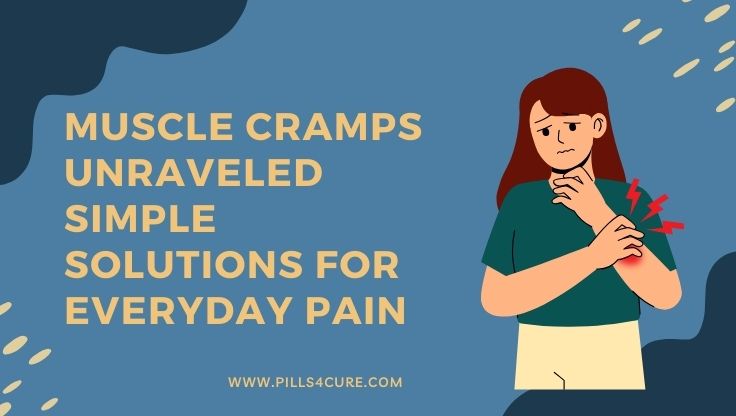Muscle cramps are a common yet often overlooked problem among seniors, often interfering with daily life and mobility. These sudden, involuntary contractions can appear without warning, bringing sharp pain and discomfort. In this comprehensive guide, we’ll explain muscle cramps meaning, explore causes such as full body cramps causes and what diseases cause muscle cramps, and share practical tips for muscle cramps treatment. Whether you experience muscle cramps when stretching or struggle with lingering after cramps muscle pain, knowing how to manage and prevent these episodes is essential for maintaining an active lifestyle. In some cases, medications like baclofen muscle relaxant may be considered to help reduce muscle tightness and improve comfort. Let’s dive in to empower you with the knowledge needed for better senior health.
Understanding Muscle Cramps: What Do They Mean?
Muscle cramps meaning refers to the abrupt tightening of a muscle that doesn’t relax right away, leading to intense pain that can last from seconds to minutes. In seniors, these cramps often occur in the legs, feet, or hands, but they can affect any muscle group. Factors like dehydration, electrolyte imbalances, or poor circulation exacerbate the issue. If you’ve ever woken up with all muscles cramping up, you know how debilitating it can be—it’s your body’s signal that something needs attention.
For older adults, muscle cramps when stretching might happen during routine activities like yoga or simple morning routines, often due to overexertion or inadequate warm-up. Meanwhile, after cramps muscle pain can linger as soreness, stemming from microscopic muscle damage during the cramp itself. Recognizing these patterns is the first step toward effective management.
Common Causes of Muscle Cramps in Seniors
Unraveling full body cramps causes requires looking at a mix of lifestyle, medical, and environmental factors. Dehydration tops the list, especially in warmer climates or with diuretic medications. Electrolyte deficiencies—low levels of potassium, calcium, or magnesium—play a significant role, often linked to diet or certain health conditions.
What diseases cause muscle cramps? Chronic illnesses like diabetes, kidney disease, and thyroid disorders can trigger cramps by disrupting mineral balance or nerve function. Neurological disorders that cause muscle cramps include peripheral neuropathy, where nerve damage leads to erratic signals, or conditions like Parkinson’s disease and multiple sclerosis, which affect muscle control. In rare cases, vascular issues such as peripheral artery disease restrict blood flow, prompting cramps during activity.
If cramps feel widespread, like all muscles cramping up, it could indicate systemic problems such as medication side effects (e.g., statins for cholesterol) or even underlying infections. Always consult a healthcare provider to rule out serious causes.
Effective Muscle Cramps Treatment Options
When a cramp hits, quick action can ease the pain. For immediate muscle cramps treatment, gently stretch the affected muscle—point your toes upward for leg cramps or massage the area to promote blood flow. Applying heat (like a warm towel) or cold packs can also help, depending on what feels better.
For ongoing issues, muscle cramps medicine includes over-the-counter options like quinine sulfate (though use with caution due to FDA warnings) or magnesium supplements if deficiency is confirmed via blood tests. Prescription muscle cramps medicine might involve antispasmodics. One notable example is baclofen muscle relaxant, which works by inhibiting nerve signals in the spinal cord to reduce muscle spasms. It’s particularly useful for cramps tied to neurological disorders that cause muscle cramps, but it requires a doctor’s prescription and monitoring for side effects like drowsiness.
In severe cases, physical therapy or acupuncture can provide relief. Hydration therapy or IV electrolytes in a clinical setting might be necessary for acute full body cramps causes related to imbalances.
How to Prevent Muscle Cramps: Proactive Strategies
Prevention is better than cure, and knowing how to prevent muscle cramps can significantly improve quality of life. Start with hydration: Aim for at least 8 glasses of water daily, more if active or in hot weather. Incorporate electrolyte-rich foods like bananas, spinach, and yogurt into your diet.
Regular exercise, including gentle stretching routines, helps avoid muscle cramps when stretching. Warm up before any activity and cool down afterward to maintain flexibility. If you’re prone to nighttime cramps, try leg stretches before bed.
Lifestyle tweaks include wearing supportive shoes, maintaining a healthy weight to reduce strain, and managing medications with your doctor to minimize side effects. For those with neurological disorders that cause muscle cramps, consistent medical follow-up is crucial.
Precautions for Managing Muscle Cramps in Seniors
While self-care is empowering, precautions are essential to avoid complications. Never ignore persistent after cramps muscle pain, as it could signal injury or deeper issues—seek medical advice if pain lasts over a few days. Avoid self-medicating with muscle cramps medicine without consulting a professional, especially if you have kidney or heart conditions.
Be cautious with baclofen muscle relaxant; it’s not for everyone and can interact with other drugs. During episodes of all muscles cramping up, stay calm to prevent falls—sit or lie down until it passes. Seniors with mobility aids should ensure they’re stable during cramps. Finally, track your cramps in a journal, noting triggers like diet or activity, to identify patterns for better prevention.
Frequently Asked Questions (FAQs)
What is the muscle cramps meaning in simple terms?
Muscle cramps meaning an unexpected, painful tightening of a muscle that won’t relax immediately. It’s common in seniors due to age-related changes in muscle and nerve function.
Why do I get muscle cramps when stretching?
Muscle cramps when stretching often result from sudden overextension without proper warm-up, dehydration, or electrolyte shortages. Gradual stretching and hydration can help.
What are full body cramps causes?
Full body cramps causes include severe dehydration, mineral deficiencies, medication side effects, or systemic conditions like infections or metabolic disorders. Consult a doctor for evaluation.
What diseases cause muscle cramps?
What diseases cause muscle cramps? Examples include diabetes, kidney failure, hypothyroidism, and vascular diseases that impair circulation or electrolyte balance.
Which neurological disorders that cause muscle cramps?
Neurological disorders that cause muscle cramps encompass peripheral neuropathy, amyotrophic lateral sclerosis (ALS), multiple sclerosis, and spinal cord injuries, all disrupting nerve-muscle communication.
How can I relieve after cramps muscle pain?
To ease after cramps muscle pain, rest the area, apply ice or heat, and use gentle massage. Over-the-counter pain relievers like ibuprofen can help, but check with your doctor first.
What is the best muscle cramps treatment at home?
The best muscle cramps treatment at home involves stretching, hydration, and electrolyte intake. For frequent issues, consider supplements after medical advice.
Are there effective muscle cramps medicine options?
Yes, muscle cramps medicine ranges from OTC magnesium to prescriptions like baclofen muscle relaxant. Always get personalized recommendations from a healthcare provider.
How to prevent muscle cramps effectively?
How to prevent muscle cramps? Stay hydrated, eat balanced meals, exercise regularly with stretches, and manage underlying health conditions proactively.
Is baclofen muscle relaxant safe for seniors?
Baclofen muscle relaxant can be effective for cramps but may cause side effects like dizziness. It’s safe under medical supervision, tailored to individual health needs.



